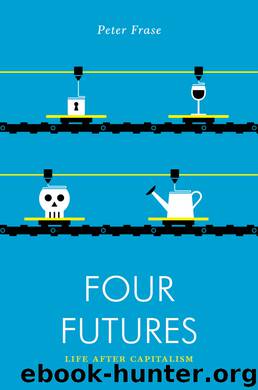Four Futures by Peter Frase

Author:Peter Frase [Frase, Peter]
Language: eng
Format: epub
Publisher: Verso Books
Published: 0101-01-01T00:00:00+00:00
Anti–Star Trek
As we have seen in the earlier chapters, Star Trek provides a fable of an egalitarian, postscarcity society. But what does that look like without the egalitarianism? In other words, given the material abundance made possible by the replicator, how would it be possible to maintain a system based on money, profit, and class power?
Economists like to say that capitalist market economies work optimally when they are used to allocate scarce goods. So how to maintain capitalism in a world were scarcity can be largely overcome? This requires a kind of antithesis of the Star Trek universe, which takes the same technical preconditions and casts them in a different set of social relations.
As noted above, intellectual property differs from other property because it grants rights not just over concrete objects but over patterns and all copies and uses of those patterns. And the entire infrastructure of Star Trek is based on patterns that are fed into the replicator and used as the basis for fabricating a physical object, just as a blueprint provides the guidelines for building a house.
This is the quality of intellectual property law that provides an economic foundation for anti–Star Trek: the ability to tell others how to use copies of an idea or pattern that you “own.” So imagine that unlike Star Trek, we don’t all have access to our own replicators. And that in order to get access to a replicator, you would have to buy one from a company that licenses you the right to use it. You can’t get someone to give you a replicator or make one with their replicator, because that would violate their license and get them in legal trouble. What’s more, every time you make something with the replicator, you also need to pay a licensing fee to whoever owns the rights to that particular thing. Captain Jean-Luc Picard customarily walks to the replicator and requests “tea, Earl Grey, hot.” But his anti–Star Trek counterpart would have to pay the company that has copyrighted the replicator pattern for hot Earl Grey tea. (Presumably some other company owns the rights to cold tea.)
Something like the anti–Star Trek world is seemingly portrayed in Warren Ellis’s turn-of-the-millennium comic book series Transmetropolitan. The story centers around hard-boiled journalist Spider Jerusalem as he makes his way through the grimy, violent, and hedonistic world some unspecified time into the future. Spider has a “maker,” which seems to be something like a replicator, although quite a bit odder and more unpredictable. And in addition to raw material, Spider must wait for a new season of “maker codes” in order to replicate new things.
The anti–Star Trek model solves the problem of how to maintain for-profit capitalist enterprise, at least on the surface. Anyone who tries to supply their needs from their replicator without paying the copyright cartels would become an outlaw, Aaron Swartz or Jammie Thomas-Rasset. But if everyone is constantly being forced to pay out money in licensing fees, then they need some way of earning money, and this brings up a new problem.
Download
This site does not store any files on its server. We only index and link to content provided by other sites. Please contact the content providers to delete copyright contents if any and email us, we'll remove relevant links or contents immediately.
| Anthropology | Archaeology |
| Philosophy | Politics & Government |
| Social Sciences | Sociology |
| Women's Studies |
Born to Run: by Christopher McDougall(7127)
The Leavers by Lisa Ko(6948)
iGen by Jean M. Twenge(5415)
Sapiens by Yuval Noah Harari(5370)
Spare by Prince Harry The Duke of Sussex(5196)
The Kite Runner by Khaled Hosseini(5179)
Machine Learning at Scale with H2O by Gregory Keys | David Whiting(4313)
Bullshit Jobs by David Graeber(4190)
Never by Ken Follett(3956)
Goodbye Paradise(3810)
Livewired by David Eagleman(3772)
Fairy Tale by Stephen King(3396)
A Dictionary of Sociology by Unknown(3085)
Harry Potter 4 - Harry Potter and The Goblet of Fire by J.K.Rowling(3073)
The Social Psychology of Inequality by Unknown(3031)
The Club by A.L. Brooks(2925)
Will by Will Smith(2919)
0041152001443424520 .pdf by Unknown(2845)
People of the Earth: An Introduction to World Prehistory by Dr. Brian Fagan & Nadia Durrani(2736)
